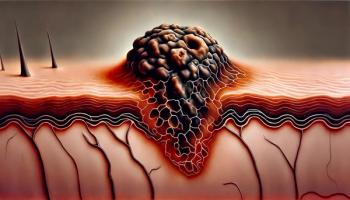
Anti-PD1, CTLA-4 Immunotherapy-Related Neurotoxicities ‘Not Uncommon’ in Patients With Melanoma
Immune checkpoint inhibitor-related neurotoxicities are more frequent in clinical practice than clinical trials.
Immune checkpoint inhibitor-related neurotoxicities are more frequent in clinical practice than clinical trials-particularly among patients receiving ipilimumab (Yervoy) plus nivolumab (Opdivo) combination therapy (ipi+nivo), according to a retrospective single-institution cohort study
“Neurologic toxicity is not uncommon, and may be more frequent in patients treated with combination ipi+nivo,” reported coauthor James Larkin, MD, of the Royal Marsden Hospital in London, and colleagues.
“A prompt and considered approach is required to optimize outcomes in this group of patients,” they concluded. “There is a risk of neurological irAEs [immunotherapy-related adverse events] at any stage throughout the course of treatment with immune-checkpoint agents, however presentations within the first four months predominated in our cohort (8/10, 80%).”
Small numbers prevented “any definitive statements,” but findings from the review suggest the possibility that neurotoxicity might predict treatment response, the team noted.
Immune checkpoint blockade with anti-PD1 and anti-CTLA-4 antibodies has “greatly improved” survival among patients with advanced melanoma and previously published clinical trial data suggests a cumulative neurotoxicity incidence of less than 1% among patients with melanoma receiving ipilimumab, nivolumab, or pembrolizumab (Keytruda) monotherapy, the researchers reported.
But an emerging literature of case reports suggests that neurotoxicities might be more frequently associated with these immunotherapy agents than was initially believed, they noted.
The coauthors therefore reviewed medical records for 352 patients treated with immune checkpoint inhibitors between 2010 and 2015 at the Royal Marsden Hospital in London, including ipilimumab, nivolumab, or pembrolizumab monotherapy, or combination ipi+nivo therapy.
Among these patients, 2.8% overall experienced neurotoxicities of the central and peripheral nervous systems, ranging from grade 1 to grade 4 in severity. However, patients treated with combination ipilimumab plus nivolumab experienced a much higher neurological toxicities rate of 14%, the authors reported.
Examples of recorded neurotoxicities included peripheral neuropathy, phrenic neuropathy, bulbar palsy, sensory deficits such as the loss of fine touch sensations, pain, exertional dyspnea, inspiratory muscle weakness, and lumbosacral plexopathy.
“Our report presents several cases of neurological toxicity that do not neatly fit the characteristics of ‘typical’ neurological syndromes,” the researchers noted. “Both peripheral and central nervous systems may be affected and there does not appear to be a clear predominance of one over the other, although in our cohort the peripheral nervous system was more commonly impacts (70% versus 30% of cases).”
In some cases, neurotoxicity might have resulted from neuronal microvessel inflammation, and in some cases edema, they noted. The study team did not include dysgeusia (e.g., rancid or metallic taste sensations) as a reportable neurotoxicity in their records review.
Most immune checkpoint-related neurotoxicities “can be effectively reversed with corticosteroids,” the authors noted, although the cautioned that some patients did not respond to steroids. Among the five of these patients who were treated with corticosteroids, three responded well, the team noted. Six of the 10 patients with neurotoxicity had recovered fully at a median follow-up of 26.7 months.
Newsletter
Stay up to date on recent advances in the multidisciplinary approach to cancer.















































